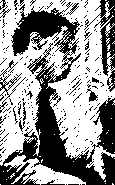ISSUE
2
December 2001

MILKWOOD REVIEW


|

THE SEGREGATED HEART, cont.
Third Home
The radio says flooding in Mississippi and parts of Alabama.
Outside my door, the rain washes pollen in a yellow stream
off the porch and down the steps. The pines have been in bloom
for the last week, the wind moves through them in gusts
and becomes visible in sudden yellow clouds that lift from the trees.
Inside my house, my floors, my clothes, are thick with yellow dust.
Before the storm broke, I watched the bees investigate
the corners of my porch, the oval bell of my wind chimes,
looking for a home before their swarm. I know inside the hive
the virgin workers lie, with bent head and folded arm,
each sealed within her quiet cell until waked from larval sleep
by the dance and beating wings of her sisters. At first flight
each fears to leave behind the fixed prismatic form,
each soars and returns twenty times, hesitates at the void of space,
the indistinct brilliant mass of colors, the yellow and blue,
the wind that twists her to and from her course.
She shrinks at first from the infinite loneliness of light
but knows she can return to the translucent walls of honeycomb
where her sisters work and others wait to be born.
I live with no sister and have no daughter to name or raise.
I have no home except what I make for myself. Today it is
three rooms surrounded by rain where thunder cracks.
What I left I will not return to: yet I live in it every day.
The radio says mill workers in Wilson have brown lung,
their cells of pink flesh filled up with cotton dust.
The radio reports four women on foot from a dance,
shotgunned: they bled through small pellet wounds,
bright red holes in their dark skin and evening clothes.
The police see no connection between this and two crosses
burned in town that night, white flames fixed at right angles.
If I stand in the doorway, the storm drowns out the radio.
I put my hands in the rain, louder than rushing blood,
colder than the tears of my anger or despair. My home is not safe
but dangerous with pain that aches like a cracked bone healing.
I refuse the divisions: yet always they break again.
I miss my mother and Laura who raised me. They still live
in the same and in different houses. I live here knowing
that the separation ends only when it is felt,
that the whole mends only when the fragments are held.
I long for a garden, a place to plant in day-lilies, then sit
and watch them bloom each year, but I do not work for this.
Instead I take my plants in red clay pots out to catch the rain,
then set them inside where each leaf will focus the sun
like a burning green lens. I sit cross-legged on the porch
and turn my life outside in and out again, while in the pines
rain pierces the dark green needles with silver thread.
I mend the separation in my heart. I hold the heart's sorrow
and it blooms red, the courage to speak across distances,
the courage to act, like spider-lilies rising unexpected
every fall, in a deserted garden, along old foundations.
from Minnie Bruce Pratt,
The Sound of One Fork
(Night Heron Press, 1981),
Revised 2001

|

